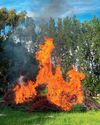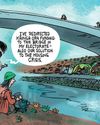試す 金 - 無料
Extraterrestrial litterbugs
New Zealand Listener
|June 17-23 2023
After trashing Earth, we now risk doing the same to space, writes PETERSINGER, with AGATA SAGAN, in the second of three essays.

In April 10, 2019, scientists produced the first image of a black hole, a century after Einstein’s work had implied the existence of such extraordinary objects. You didn’t need to know a lot of physics to be impressed by the image. The black hole it showed was some 55 million light-years distant from us and had a diameter about 3 million times that of the Earth. Like the famous “Earthrise” photograph taken by William Anders during the 1968 Apollo 8 mission, showing the Earth rising over the surface of the moon, the image of the black hole calls on us to assess our place in the universe, but the two photos pull us in different directions. “Earthrise” allowed us to see our planet as a sphere in space and emphatically displays the importance of making that sphere sustainable. Seeing the black hole, in contrast, forces us to grapple with the strangeness of the universe of which we are such a tiny part.
In the same week that we marvelled at the black hole, a private Israeli lunar probe, Beresheet, experienced a technical glitch and crashed onto the surface of the Moon. Its venture into space, like Elon Musk’s SpaceX venture that plans to colonise Mars, raises ethical issues about humans’ exploration and use of the universe beyond their own planet. Are the solar system and the entire universe beyond now open for everyone to colonise, for whatever purpose they wish, if they have the means to do so?
このストーリーは、New Zealand Listener の June 17-23 2023 版からのものです。
Magzter GOLD を購読すると、厳選された何千ものプレミアム記事や、10,000 以上の雑誌や新聞にアクセスできます。
すでに購読者ですか? サインイン
New Zealand Listener からのその他のストーリー

New Zealand Listener
Down to earth diva
One of the great singers of our time, Joyce DiDonato is set to make her New Zealand debut with Berlioz.
8 mins
29 November-December 5 2025

New Zealand Listener
Tamahori in his own words
Opening credits
5 mins
29 November-December 5 2025

New Zealand Listener
Thought bubbles
Why do chewing gum and doodling help us concentrate?
3 mins
29 November-December 5 2025

New Zealand Listener
The Don
Sir Donald McIntyre, 1934-2025
2 mins
29 November-December 5 2025

New Zealand Listener
I'm a firestarter
Late spring is bonfire season out here in the sticks. It is the time of year when we rural types - even we half-baked, lily-livered ones who have washed up from the city - set fire to enormous piles of dead wood, felled trees and sundry vegetation that have been building up since last summer, or perhaps even the summer before.
2 mins
29 November-December 5 2025

New Zealand Listener
Salary sticks
Most discussions around pay equity involve raising women's wages to the equivalent of men's. But there is an alternative.
3 mins
29 November-December 5 2025

New Zealand Listener
THE NOSE KNOWS
A New Zealand innovation is clearing the air for hayfever sufferers and revolutionising the $30 billion global nasal decongestant market.
2 mins
29 November-December 5 2025

New Zealand Listener
View from the hilltop
A classy Hawke's Bay syrah hits all the right notes to command a high price.
2 mins
29 November-December 5 2025

New Zealand Listener
Speak easy
Much is still unknown about the causes of stuttering but researchers are making progress on its genetic origins.
3 mins
29 November-December 5 2025

New Zealand Listener
Recycling the family silver?
As election year looms, National is looking for ways to pay for its inevitable promises.
4 mins
29 November-December 5 2025
Translate
Change font size

